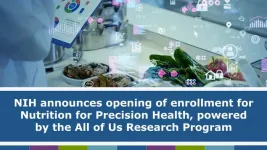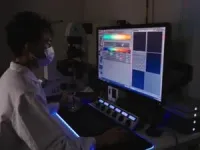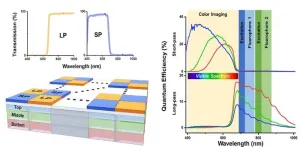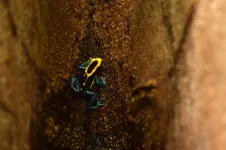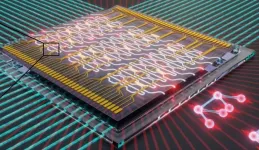(Press-News.org) CHICAGO—May 26, 2023—Illinois Institute of Technology is one of 14 institutions chosen as an enrollment site for the National Institute of Health’s landmark initiative to advance nutrition research. Nutrition for Precision Health (NPH), powered by the All of Us Research Program, is working to engage 10,000 participants from diverse backgrounds across the United States with the aim of learning about how our bodies respond differently to food.
NPH will use artificial intelligence–based approaches to analyze information provided by participants in order to develop algorithms that predict responses to dietary patterns. The study’s findings may one day allow healthcare providers to offer more customized nutritional guidance to improve overall health.
“Poor diet is one of the leading causes of preventable disease and death around the world. If everyone followed the healthy eating guidelines that we have available now, we still may not achieve optimal health because our bodies respond differently to food,” said Holly Nicastro, Ph.D., MPH, coordinator of NPH. “Through this study, we are looking to better understand differences in individual responses and pave the way for more tailored guidelines in the future.”
Illinois Tech, working with Northwestern University and the University of Chicago, will leverage the existing Illinois Precision Medicine Consortium (IPMC) to help All of Us Research Program participants join an investigation into the specific elements of distinctive dietary patterns after assessing people’s usual diet and their body’s response to a standard meal challenge. Comprehensive analysis of people’s blood, urine, and their gut microbiome under the different diets—along with factors including genes, lifestyle, health history, and the social determinants of health—will feed intensely rich data enabling AI predictive models to create personalized diet recommendations to reduce public health issues such as obesity, blood pressure control, diabetes, and more.
“We are excited to be a part of this revolutionary project that utilizes cutting-edge analytical and computational technologies and engages diverse communities in the scientific process,” says Britt Burton-Freeman, Professor and director of the Center for Nutrition Research and chair of Illinois Tech’s Department of Food Science and Nutrition. “There is no ‘one size fits all’ diet, and through this study, we hope to glean insights that will lead to more personalized dietary guidance, empowering individuals to make food and nutritional choices that will best serve their health and well-being.”
To participate in NPH, individuals must be aged 18 or over and must enroll in or already be enrolled in NIH’s All of Us Research Program(link is external). All of Us is an effort that aims to engage at least 1 million participants in building a health database that reflects the diversity of the U.S., to help speed up medical research and enable individualized prevention, treatment, and care options.
The NPH study consists of three components. All study participants will participate in the first component, while a subset will take part in the other two components. In the first component of the study, participants will be asked to complete surveys, report their daily diets, and provide blood, urine, and stool samples for lab tests, including microbiome analysis. In the second component, a subset of participants will be given diets selected by researchers. In the third component, participants will also be given diets selected by researchers but will be requested to reside in a research center while on the diets. Participants from all three components of the study will participate in meal challenge tests that measure biological changes after they consume a standardized study-provided meal or drink. Participants will receive interpreted information from the study on their health, including body fat percentage, microbiome makeup, metabolism, and diet composition.
NPH will link participants’ data from the study to information obtained through the All of Us Research Program, including genetics information and data from electronic health records and additional surveys. The study will leverage advances in AI to analyze this vast amount of data from participants to develop algorithms predicting how a person will respond to a particular food or diet based on various factors. All of this data will ultimately be accessible through All of Us’ data platform, the Researcher Workbench(link is external), to support many other studies on health and disease. Strict safeguards are in place to keep the data secure and protect participant privacy.
“Nutrition is perhaps one of the most powerful medicines we have available, but is among the least understood,” said Geoffrey Ginsburg, M.D., Ph.D., All of Us’ chief medical and scientific officer. “By tapping into the All of Us infrastructure and platform, NPH will be set apart from other nutrition studies by its scale and diversity. The value of NPH will be amplified by the research community as new data types are made broadly available in the Researcher Workbench to explore and advance our understanding of nutrition and health.”
To learn more about NPH and how to join the study, please visit nutritionforprecisionhealth.org.
The work described here is supported by the National Institutes of Health award # 1 UG1 HD107697-01.
“All of Us” and “Nutrition for Precision Health, powered by the All of Us Research Program” are service marks of the U.S. Department of Health & Human Services (HHS).
END
Illinois Tech announced as enrollment partner in NIH’s AI precision nutrition research, largest project of its kind
Ambitious research project aims to enroll 10,000 participants from diverse communities, using AI analysis to create a foundation for personalized dietary advice
2023-05-26
ELSE PRESS RELEASES FROM THIS DATE:
World leader in photonics gives talk at Aston University
2023-05-26
Talk by one of the leading lights in optical communications
Dr. Ming-Jun Li is currently a corporate fellow at Corning Incorporated
He discussed installed optical fibres for ultra-wideband transmission systems.
26 May 2023 | Birmingham, UK
Aston University has hosted one of the leading lights in optical communications and speciality optical fibres at its second international photonics workshop.
Dr. Ming-Jun Li is currently a corporate fellow at Corning Incorporated in the USA and headed ...
GPS tracking reveals how a female baboon stopped using urban space after giving birth
2023-05-26
A new study from Swansea University and the University of Cape Town provides the first documented evidence of a cessation in urban space use by a female baboon after giving birth: another example of how wild animals are adaptively responding to urbanisation.
The study, recently published in the journal Ecology & Evolution, used GPS collars to track the movements of 13 chacma baboons in Cape Town, South Africa.
The data revealed that when one collared female gave birth, she stopped using urban space without any significant change in daily distance travelled or social interactions that would be expected with general risk-sensitive behaviour during this ...
Tree islands bring biodiversity to oil palm plantations
2023-05-26
Islands of trees in oil palm plantations can significantly increase biodiversity within five years without reducing productivity. This has been shown by an experiment, which has been running for over ten years in Indonesia as part of the Collaborative Research Centre (CRC) "EFForTS" at the University of Göttingen. An international team of researchers led by Göttingen planted experimental islands of trees in plantations on the island of Sumatra to counteract the species loss caused by the ...
Innovative endoscopic imaging system can detect multiple fluorescent tracers
2023-05-26
For patients with solid cancers, endoscopic surgery is one of the primary treatment options to remove tumors. However, there is a high risk of cancer recurrence if even a small number of cancerous cells are left behind after surgical resection. To prevent this from happening, researchers developed fluorescence-guided surgery (FGS). In FGS, patients are injected with a fluorescent probe that preferentially binds to tumor cells, enabling surgeons to easily identify lesions with the help of specialized endoscopes that emit the necessary excitation light.
Unfortunately, tumors can be highly heterogeneous, ...
CHOP researchers show that IgA fine tunes the body’s interactions with microbes
2023-05-26
Philadelphia, May 26, 2023—IgA deficiency is the most common primary immune deficiency worldwide, but its presentation has puzzled physcians and researchers. Some with the disorder present with symptoms like recurrent infections, autoimmune disease, or allergies, whereas others have no symptoms at all and only become aware of their IgA-deficient status through an incidental finding on a blood test. This variability has raised the question among researchers: Why aren’t many of those with IgA deficiency sicker?
A new study by researchers at Children’s ...
Protein-based nano-‘computer’ evolves in ability to influence cell behavior
2023-05-26
HERSHEY, Pa. — The first protein-based nano-computing agent that functions as a circuit has been created by Penn State researchers. The milestone puts them one step closer to developing next-generation cell-based therapies to treat diseases like diabetes and cancer.
Traditional synthetic biology approaches for cell-based therapies, such as ones that destroy cancer cells or encourage tissue regeneration after injury, rely on the expression or suppression of proteins that produce a desired action within a cell. This approach can take time (for proteins ...
Gene therapy rescues hearing for the first time in aged mouse models
2023-05-26
By 2050, one in 10 individuals are expected to live with some form of hearing loss. Of the hundreds of millions of cases of hearing loss affecting individuals worldwide, genetic hearing loss is often the most difficult to treat. While hearing aids and cochlear implants offer limited relief, no available treatment can reverse or prevent this group of genetic conditions, prompting scientists to evaluate gene therapies for alternative solutions.
One of the most promising tools used in these therapies—adeno associated virus (AAV) vectors—has galvanized the hearing-loss community in recent years. ...
The mechanisms behind swallowing
2023-05-26
Sensory cells in the vagus nerve can detect and locate food in the esophagus. Their signals help transport the food onward to the stomach. Signal failure leads to swallowing disorders, say a team led by Carmen Birchmeier at the Max Delbrück Center. They have published their findings in “Neuron.”
Swallowing disorders can have many causes, and they occur more frequently in older people. But neurological diseases such as multiple sclerosis and Parkinson’s disease, and certain medications, can also prevent food moving normally from mouth to stomach. Possible consequences include malnutrition, weight loss, and dehydration.
Now a team led ...
Life through rose-coloured glasses
2023-05-26
Over thousands of years some animals have specialised to live in environments where the sun never shines: giant squid with eyes the size of volleyballs see even in the darkest depths while others, like cave-dwelling olms, have lost the functionality of their eyes completely. But for animals that do not live in these extremes, how do species manage a world that suddenly becomes dark? Lakes that become turbid from algal blooms, agricultural run-off, or other environmental pollutants represent common examples of environmental disturbances that can impact the visual scene that ...
Promising building blocks for photonic quantum simulators
2023-05-26
Researchers at the Niels Bohr Institute have, collaborating with the University of Münster and Ruhr-Universität Bochum, developed new technology capable of processing the enormous amounts of information quantum systems generate. Deterministic single photon light sources, creating quantum bits at extreme rates and speed are now coupled to specially designed, integrated photonic circuits, capable of processing quantum information with adequate speed and quality without degrading the susceptible quantum states. This means that the first steps have been taken towards the development of photonic quantum devices that can, for example, ...
LAST 30 PRESS RELEASES:
The Lancet: New weight loss pill leads to greater blood sugar control and weight loss for people with diabetes than current oral GLP-1, phase 3 trial finds
Pediatric investigation study highlights two-way association between teen fitness and confidence
Researchers develop cognitive tool kit enabling early Alzheimer's detection in Mandarin Chinese
New book captures hidden toll of immigration enforcement on families
New record: Laser cuts bone deeper than before
Heart attack deaths rose between 2011 and 2022 among adults younger than age 55
Will melting glaciers slow climate change? A prevailing theory is on shaky ground
New treatment may dramatically improve survival for those with deadly brain cancer
Here we grow: chondrocytes’ behavior reveals novel targets for bone growth disorders
Leaping puddles create new rules for water physics
Scientists identify key protein that stops malaria parasite growth
Wildfire smoke linked to rise in violent assaults, new 11-year study finds
New technology could use sunlight to break down ‘forever chemicals’
Green hydrogen without forever chemicals and iridium
Billion-DKK grant for research in green transformation of the built environment
For solar power to truly provide affordable energy access, we need to deploy it better
Middle-aged men are most vulnerable to faster aging due to ‘forever chemicals’
Starving cancer: Nutrient deprivation effects on synovial sarcoma
Speaking from the heart: Study identifies key concerns of parenting with an early-onset cardiovascular condition
From the Late Bronze Age to today - Old Irish Goat carries 3,000 years of Irish history
Emerging class of antibiotics to tackle global tuberculosis crisis
Researchers create distortion-resistant energy materials to improve lithium-ion batteries
Scientists create the most detailed molecular map to date of the developing Down syndrome brain
Nutrient uptake gets to the root of roots
Aspirin not a quick fix for preventing bowel cancer
HPV vaccination provides “sustained protection” against cervical cancer
Many post-authorization studies fail to comply with public disclosure rules
GLP-1 drugs combined with healthy lifestyle habits linked with reduced cardiovascular risk among diabetes patients
Solved: New analysis of Apollo Moon samples finally settles debate about lunar magnetic field
University of Birmingham to host national computing center
[Press-News.org] Illinois Tech announced as enrollment partner in NIH’s AI precision nutrition research, largest project of its kindAmbitious research project aims to enroll 10,000 participants from diverse communities, using AI analysis to create a foundation for personalized dietary advice
